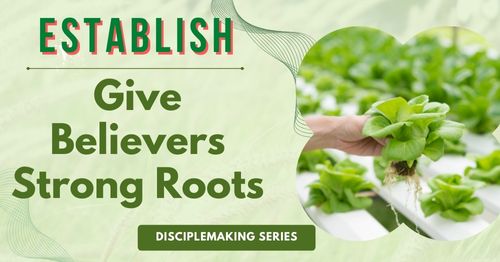Establish • Give Believers Strong Roots

AI was not used to generate this post.
When you trusted in Christ, were you discipled as a new believer to help you understand the basics of Christianity? If not, have you struggled in your faith? New and young believers need to be established in their faith. In reality, every Christian needs to have a strong foundation that provides strong roots. Strong roots prevent instability and insecurity. Jesus modeled how to establish believers in the truth. We can follow His example as we intentionally disciple new and never-been-discipled Christians among our friends and church family. Look at what new and young believers need to know to grow spiritually strong. This is blog #6 in our “Lifestyle Disciplemaking” blog series, adapted from our book, Leap into Lifestyle Disciplemaking.
Key Takeaways
- New believers need strong roots in their faith to prevent instability and insecurity.
- Jesus modeled how to establish believers by teaching them essential truths and encouraging obedience to God.
- Disciplemakers must personally support new Christians, helping them get rooted in the basics of faith and connected to a community.
- New Christians require guidance in reading the Bible, understanding their identity in Christ, and knowing the role of the Holy Spirit.
- Resources like the ‘Fresh Start Bible Study’ can help disciplemakers effectively establish believers in their faith.
Listen to this blog as a similar podcast:
Jesus modeled how to establish believers in the truth.
During the last two years of His earthly ministry, Jesus intentionally taught His 12 disciples and many others to know Him, to follow Him, and to obey Him. He established them in truth He wanted them to know.
To establish means “to build a solid foundation; to provide strong roots.”
Establish is a good word to describe growing in your faith. That is what Jesus did for everyone who had committed to follow Him as a disciple. He established them in truth and what it means to apply that truth in obedience to God.
In the first article in this series, “The Call to Lifestyle Disciplemaking,” I defined a disciple as an active follower or learner. If you follow Jesus as His disciple, you are making the choice to learn from Jesus through what is taught in the Bible and apply those teachings to your life.
We tend to focus on the healing miracles in the gospels. But Jesus spent time more time teaching people than just healing. Often, the teaching came first.
When Jesus landed and saw a large crowd, he had compassion on them, because they were like sheep without a shepherd. So he began teaching them many things. (Mark 6:34)
Jesus taught in many villages, both in the synagogues and out in the open. Matthew records for us examples of the sermons that Jesus gave—solid teaching of truth. The gospels also record parables He told as illustrations of biblical truth. His audience included men, women, and children.. A number of those men and women, stayed close to listen to every word, including His 12 disciples. And women were getting established in the truth in the same way that the men were.
First, we can see that Jesus taught them truth based on Old Testament scriptures. He highlighted what they needed to know as truth and countered any error they had been taught by some of the Jewish leaders. Then, He challenged them to apply what He taught them in obedience to God. After His death and resurrection, a group of 120 men and women were prepared and waiting for the Holy Spirit to come (Acts 1:12-15; 2:1-4). No longer able to visibly see the Lord, they learned to depend on the Spirit living inside of them to continue teaching them the truths they needed to know about their new life in Christ.
On the day of Pentecost, the Lord added 3000 new believers to their number. All those new believers needed to be established in their faith. The Apostles did that through consistent teaching.
They devoted themselves to the apostles’ teaching and to fellowship, to the breaking of bread and to prayer. (Acts 2:42)
Generation after generation, mature Christians have been used by God to establish new believers in the truths of the faith, down to the teachers who taught you truth to establish you and give you roots as a Christian. New and young believers need to be established in their faith. In reality, every Christian needs to have a strong foundation that provides strong roots. Strong roots prevent instability and insecurity.
So Christ Himself gave the apostles, the prophets, the evangelists, the pastors and teachers, to equip his people for works of service, so that the body of Christ may be built up until we all reach unity in the faith and in the knowledge of the Son of God and become mature, attaining to the whole measure of the fullness of Christ. Then we will no longer be infants, tossed back and forth by the waves, and blown here and there by every wind of teaching and by the cunning and craftiness of people in their deceitful scheming. (Ephesians 4:11-14)
Establishing believers helps them to become mature in Christ and provides protection from deception. The ESTABLISH phase of lifestyle disciplemaking is just as important as the CONNECT phase.
Get our “Lifestyle Disciplemaking” newsletter. Click on this link and choose “Interested in lifestyle disciplemaking” as your experience level. You will receive weekly tips and encouragement for disciplemaking in your life, including stories of what others are doing.
Establishing new and young believers
As disciplemakers, we are to not only share our faith and lead others to trust in Christ, but we are also to establish them so they will get rooted in their Christian faith. I read this several years ago:
Once people trust Christ, do not leave them alone! New believers who begin the Christian life are at a critical point. Leaving the old life behind isn’t easy. Though the Holy Spirit provides the power to live victoriously, old patterns, old habits, and old temptations are still there. They need mature believers to walk alongside them while they take their first steps on the road to maturity. As a bare minimum, new believers need discipleship a minimum of once a week for eight weeks. The first eight weeks are sometimes when new converts face their greatest adjustments, strongest temptations, and biggest doubts. To have a brother or sister in Christ meeting with them makes a marked difference…When you follow-up with new believers, they are less concerned with how much you know and more concerned with how much you care. (Evantell.org)
Wow! Establishing new believers is critical. Paul wrote about the importance of this in his letter to the Colossians.
So then, just as you received Christ Jesus as Lord, continue to live your lives in him, rooted and built up in him, strengthened in the faith as you were taught, and overflowing with thankfulness. (Colossians 2:6-7)
New Christians need to be rooted and connected
The goal of establishing a new or young believer is to help her get rooted in the basics of the faith and connected with the community of believers to continue learning. Your willingness to help new believers around you get rooted in their faith flows out of your love for God and love for His people.
When Jesus places a new Christian in your life, what are your options? You can invite her to church, class, or small group and assume she will “catch on” to what she needs to know. But is that the best way? Yes, you want her to join a community of believers, but she needs you right there beside her, personally discipling her in the basics of what it means to be a Christian. That is the best way.
New Christians need spiritual milk.
Think of your new Christian friend like she is a hungry newborn baby. They need spiritual milk—regular feeding on the milk of God’s Word in order to grow.
And yearn like newborn infants for pure, spiritual milk, so that by it you may grow up to salvation, (1 Peter 2:2)
Picture bringing a newborn baby home and sitting her at the table saying, “Watch the rest of us eat. You will learn how to feed yourself and not be hungry anymore.” Do we do that? No! We feed them regularly with nourishing milk and bathe them with parental love for months so they will be healthy physically and relationally. Parents do the feeding—milk first then introducing solid food. After that, we start giving them finger foods they can handle. By the middle of their second year, they are usually feeding themselves from the table using a mouthful of teeth to do so. Yet, because new Christians are in grown bodies, we expect them to feed themselves from God’s Word just by being “at the table” (attending church or being in a small group).
Through the years, I have been in some good Bible teaching churches. A couple of them have had occasional classes for new believers to get the basics of the faith. But none of them have offered tools and the push for me to personally disciple a new believer (or a Christian who has never been discipled) to know God, what Christ did for them on the cross, and their identity in Christ. It seems like that would be an essential part of church ministry. Instead, the assumption is that if someone comes to church or Bible study, they will get what they need to know by just participating. But do they? This lack of nurture of new Christians can lead to discouragement and insecurity and a feeling of “I am not smart enough to understand anything.” They miss out on the joy of spiritual growth.
New Christians need basic training.
Just as a newborn baby needs to know the love and trustworthiness of her parents, the new Christian needs to know and experience the love and trustworthiness of her God. She needs to know some basics of the Christian faith, laying a good foundation of truth for her to grasp and apply to her life.
Consider how we prepare children to know certain basics before entering kindergarten—letters and numbers, some personal hygiene (using the toilet, washing their hands, using a tissue). Compare that effort with how we typically assimilate new Christians into the local church.
What assumptions do we make when we invite a new Christian to church or a small group? We assume they already have a Bible and know how to look up a verse. Bad assumption. We can no longer assume that women have been taught any truth about Jesus, the Bible, the Church, or the Christian life. The Lord wants mature Christians like you and I to be willing to establish new and young believers so they can grow strong roots.
Give them some basic Bible reading skills
The Bible is God’s Word for every new Christian so she can get to know God well. Because so many women today were not raised in a church setting, assume the one you are discipling does not know much about it. Anyone who is new to Christ and / or new to the Bible needs to know some basic skills so she can read and study a Bible.
- Make sure the one you are discipling has a Bible (print or app) in a good translation that she can understand. Lead her to find an easy-to-read Bible translation such as NIV, ESV, CSB, NLT, or NET. Avoid the paraphrase versions at first (e.g., The Message, The Passion Translation). The “The Bible App” (from Life.Church) is a good one to use. Help her to get the right app, not the copycat version that has popup ads.
- Explain to her that the Bible is one book containing a collection of 66 books combined together for our benefit. It is divided into two main parts: Old Testament and New Testament. The Old Testament tells the story of the beginning of the world and God’s promises to mankind given through the nation of Israel. It tells how the people of Israel obeyed and disobeyed God over many, many years. All the stories and messages in the Old Testament lead up to Jesus Christ’s coming to the earth. The New Testament tells the story of Jesus Christ, the early Christians, and God’s promises to all those who believe in Jesus. You can think of the Old Testament as “before Christ” and the New Testament as “after Christ.”
- Each book of the Bible is divided into chapters and verses within those chapters to make it easier to study. Bible references include the book name, chapter number and verse number(s). For example, Ephesians 2:8 refers to the New Testament book of Ephesians, the 2nd chapter, and verse 8 within that 2nd chapter.
- Use the table of contents to find a specific book of the Bible to read. Show her how to find Bible books in the table of contents of her Bible or Bible app. The Bible app lets you find books in alphabetical order rather than needing to know if it is in the Old or New Testament.
- Walk through a chapter from the gospel of Mark with her. Show her how to read the passage and let the Holy Spirit show her something from it. I usually ask the question, “What grabbed your attention?” That is the milk God wants to feed her that day.
Our Graceful Beginnings books for anyone new to the Bible have a “Bible Basics” section covering these helpful skills for new believers.
One friend of mine who became a believer as an adult said that she got herself a children’s Bible and read through it. That made it easy for her to get the gist of the Bible stories that everyone else seemed to know. I thought that was a great idea!
Introduce what all believers need to know
When a child begins piano lessons, the teacher explains what the lines and notes on the page of music represent, what sharps and flats are, and which notes are meant for the right and left hands. That is basic music theory. Likewise, for new believers in Christ, we need to make sure they get the basics in an organized fashion from someone who personally cares about them. That would include modeling for them how to share their faith and disciple someone else.
Although excellent resources exist that you can use to help them get rooted in their faith (I have a bunch on my website ready to download and use), they need a relationship more than materials. Walking alongside new believers in their first steps of spiritual growth takes time and hard work. But maybe you can be the nurturer to help them develop strong roots of faith that will hold through the years. And in the process, you find out how much you really know and understand about your own faith.
Here are eight aspects to a good foundation for every believer (new or long-term) to be “rooted and built up in Him, strengthened in the faith.”
1) Who Christ is, what He has done for us on the cross, and what His resurrection means for us
The most important thing a believer should know and understand is Christ. Christianity is Christ! It is not a lifestyle or rules of conduct. It is not a society whose members were initiated by the sprinkling or covering of water. It is about Jesus Christ and our relationship with Him. What all believers need first and foremost is to get to know Him well and be secure in their relationship with Him.
I spent some time a few years back evaluating resources available online for establishing new believers in the basics of their new faith). What I discovered is that many jump right away from, “Hooray, you are a Christian now” to, “These are all the things you have got to do, and by the way God’s going to be unhappy with you when you do anything wrong.” For those of you who know me, I bristle at that.
Too much written for new believers jumps right away into confession of sin and obedience, skipping Jesus. I do not get it! They need Jesus first and foremost. If you are discipling a new believer, get them reading the gospel of Mark right away. It is the shortest gospel and the easiest to understand.
A new believer also needs to know what Christ did for her on the cross in His death and what His resurrection gives to her. Forgiveness, reconciliation, and justification are benefits we receive from the cross and are huge relationship changers when it comes to our relationship with God. The new life she gets because of Jesus’ resurrection begins the moment she trusts in Christ and continues forever. She needs that assurance. You can read more about who Christ is.
2) Who the Holy Spirit is and how He works in our lives
The Holy Spirit is God’s empowering presence in her life. Make sure she understands that He is a person living inside of her who is actively involved in her life. He is the one helping her to understand the Bible passages she is reading. He is the one representing Jesus to her and leading her to trust Him. The Spirit is the one who produces fruit in her life and helps her to sense God’s presence with her. He is there whether she “feels” it or not. You can read more about the Spirit’s work in your life.
3) Living by the Spirit’s power rather than living by the flesh
Faith is how she received Christ and His Holy Spirit giving her new life. Faith is how she turns her life over to Jesus and trusts Him on a daily basis. Christianity is not a set of rules to follow on her own. She needs to know and understand God’s grace toward her and what it means to live in the freedom of that grace. The Christian life is a life of becoming more dependent on God and less independent of Him. It is a different way of approaching life than what the world teaches. Read more about living in God’s grace for you.
4) What prayer is and knowing God the Father’s love
Even if she did not have a good earthly father, she can by faith believe that she has a good Heavenly Father who loves her dearly and delights in her relying upon Him through prayer. Jesus taught His followers to think of God as their Heavenly Father. The Bible repeatedly calls Christians “dearly loved children” of God (Ephesians 5:1; Colossians 3:12). Dearly loved!
She needs to know that prayer is simply communicating with her Heavenly Father and hearing back from Him through what He says in the Bible. It is conversation with Someone who loves her dearly. What a privilege for the believer to go directly into God’s presence and talk with Him about whatever is on her heart. He desires to hear from her, and He promises to listen. Read more about how much you are dearly loved by God. Learn about the character of your Father God through “The God You Can Know” Bible study.
5) The believer’s identity in Christ
The moment she believed, the old self that was born in Adam died. A new self with the same body but a new interior started life as a new person with a new nature “in Christ.” That new identity contains many unconditional benefits that she got all at once the moment she trusted in Christ. These benefits make possible an unending relationship with God as her Father. One of the fundamental questions of the human race is that of identity, “Who am I?” The one secure, eternal answer is that through faith in Jesus Christ she can say, “I am in Christ, a child of God, one of God’s saints, completely loved and accepted by God.” That is an identity that no circumstance can change. Read more about your identity in Christ and download “The Believer’s Identity in Christ” chart.
6) Obedience to God flowing from love and gratitude rather than obligation
The entire Christian life is to be lived by faith not by performance (works). Other religions force their followers to adhere to a list of rules to stay acceptable to their gods. Christians should want to obey God out of love and gratitude for how much God loves us and for Jesus paying the ultimate price for our sins. Yet, we cannot live an obedient Christian life in our own strength. We must live by faith in Christ every day. By faith, we trust the Holy Spirit to enable us to obey what God wants for our lives. By faith, we learn to obey Christ and experience a life of freedom and joy. Read more about living by grace versus living by legalism.
7) Being part of the Body of Christ and enjoying its community
What a privilege it is to enjoy fellowship with God through fellowship with other believers in God’s awesome family on earth—the Church (usually written with a capital “C” to distinguish from local individual churches). While she is part of the universal Church, God wants her to be part of a local church family. It is like having relatives all over the world but living with your immediate family. A local church is a group of believers committed to worshiping Christ, teaching and learning from His Word, and supporting each other as they follow Jesus together, and proclaiming the good news to others. She can enjoy relationships and spiritual growth within a local church community.
8) Telling others about Jesus
As a follower of Jesus Christ, she now has the awesome privilege of sharing the good news of eternal life with others. There is tremendous joy in reaching out to those who do not know Jesus and introducing them to Him so they can know Him just as she now knows Him. This includes letting others see how Christ is living His life through you. And it also includes telling the good news of the gospel. If she has opportunity to tell someone one thing, she can tell them what she knows about Jesus. That is enough to plant the seed.
Resources for new Christians
Our A Fresh Start Bible Study is designed for new Christians and covers all of the basic information given above. We have several other sources to recommend for new Christians in the “Related Resources” section below. Even a young believer when provided good resources can walk a new believer through what we just called the basics.
Download our “Establish a New or Young Christian” booklet to get started.
Stay Christ-focused as you take the next steps
Lifestyle disciplemaking starts with connecting with nonbelievers so you can introduce them to Jesus. It continues with helping the women in your life who are new or never-been-discipled Christians to become established in their faith. As we get to know our neighbors, coworkers, children’s friends, or classmates, we will run across women whose lives look like they are nonbelievers. After getting to know them better, we find out they may have trusted Christ as children but never were discipled to know the truths about their new identity and way of living in Christ. They know they are saved and going to heaven when they die but not much else. No wonder they get tossed back and forth by every new idea that comes along. They are missing out on a life of freedom and joy!
Ask the Lord to reveal how you might be more intentional in establishing others in their faith. Ask Him to direct you to one person who needs you to establish her and to give you a desire for her to know the wonderful truths of being in Christ. Trust Jesus to help you do this. Then, watch what He does!
What about you? As you read through the 9 components of a solid foundation, was anything new to you? Have you been rooted with this basic information? If you have been a believer for a while but never really been discipled in the essential truths of the Christian life, we recommend that you work through the Graceful Living Bible Study. If you need a short and easy version that covers, get Pathways to a Joyful Walk Bible Study. Ask Jesus to send someone to establish you in what you need to know.
If you know women who may be Christians but live as though they are nonbelievers, what can you do? Very few churches offer a well-presented course for new believers. If yours does offer such a course, take advantage of that and invite her to take it with you. If your church does not offer this, ask her to meet with you for a few weeks and go through A Fresh Start Bible Study or one of our other short and easy studies for anyone new to the Bible.
Carefully feed the new Christian what she needs to grow to become established in her faith. Are you willing to do that for someone? So where do you find someone to disciple if you have not led someone to trust in Christ yourself? And how do you get started?
Let Jesus lead you into lifestyle disciplemaking. Jesus followers become disciplemakers.
Read all our articles in the lifestyle disciplemaking series. In the next blog, we will explore your choice to disciple others.
Lifestyle disciplemaking activities are interwoven throughout our Live Out His Love Bible Study of New Testament women and our Leap into Lifestyle Disciplemaking book. Our Bible Study Leadership Made Easy book will help you start and lead a women’s Bible Study group.
-
Live Out His Love (NT Women)—paperback
$16.00 -
Live Out His Love (NT Women)—printable / fillable
$10.00 -
Live Out His Love (NT Women)—digital reader version
$4.99 -
Leap into Lifestyle Disciplemaking—paperback
$14.00 -
Leap into Lifestyle Disciplemaking—printable
$10.00 -
Leap into Lifestyle Disciplemaking—digital reader version
$4.99 -
Bible Study Leadership Made Easy—paperback
$14.00
Image credit: sourced from a template at canva.com.
AI was not used to generate this post.







I came across you page. I cannot explain how but this one thing I can say is the Lord ministered to me through you information on him. It is a blessing to get to reach and teach others. Thank You. Especially reaching the unbeliever or those who say they believe but are not believers.